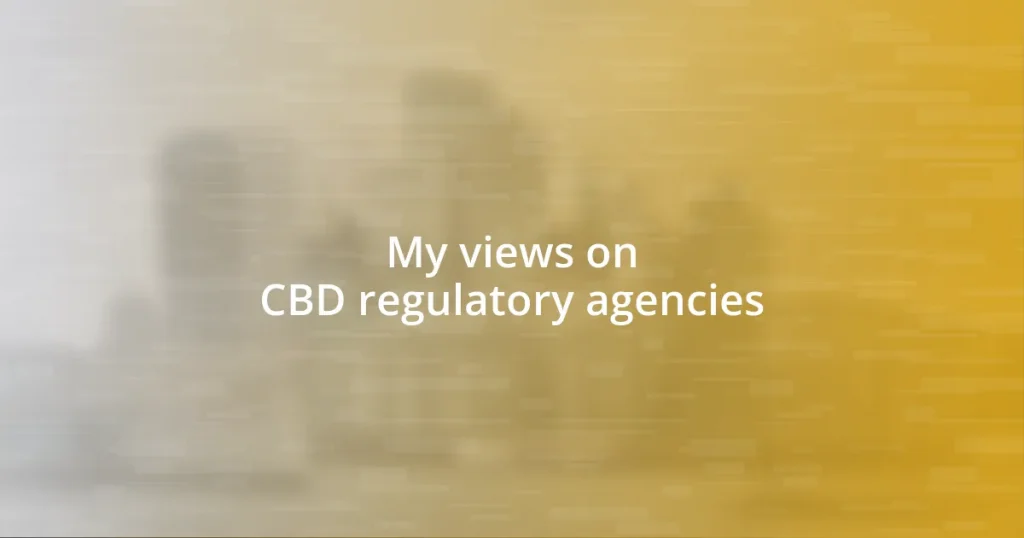Key takeaways:
- The CBD regulatory landscape is inconsistent across states, complicating consumer accessibility and informed choices.
- Regulatory agencies, like the FDA, are crucial for ensuring product safety, labeling standardization, and fostering market innovation.
- Challenges such as lack of scientific consensus and navigating between federal and state regulations hinder effective oversight.
- The future of CBD regulation is expected to focus on uniformity across states, increased collaboration, and enhanced consumer education initiatives.
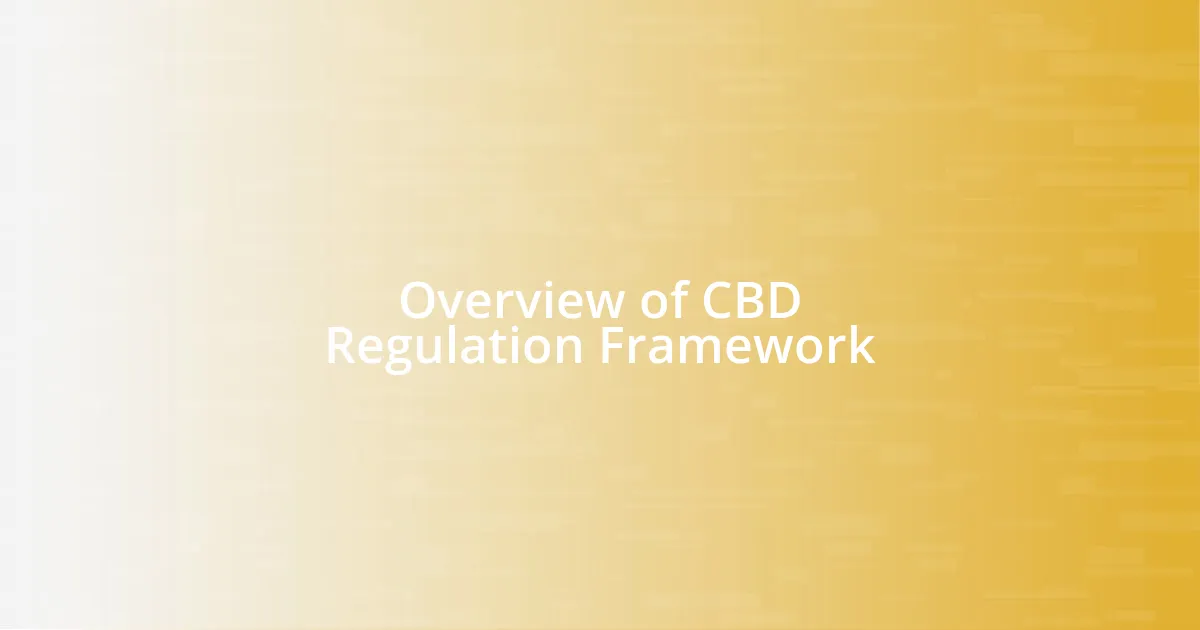
Overview of CBD Regulation Framework
The regulation of CBD is a complex landscape shaped by both state and federal agencies. I often find myself contemplating how varied those regulations can be depending on where you are. For example, in some states, CBD is widely accepted and easily accessible, while in others, it feels like navigating a maze.
What stands out to me is the patchwork nature of these regulations. I recall a conversation with a friend who was eager to try CBD for anxiety relief but felt overwhelmed by the conflicting laws and product standards. It made me wonder, how can consumers make informed choices when the guidelines seem so inconsistent?
At the federal level, agencies like the FDA and USDA play critical roles in overseeing CBD products. Yet, their guidelines can sometimes seem vague or slow to adapt to the rapidly evolving market. I often ask myself: how can regulation keep pace with innovation? This is a dilemma not just for consumers but for producers trying to comply with shifting laws while providing safe, effective products.
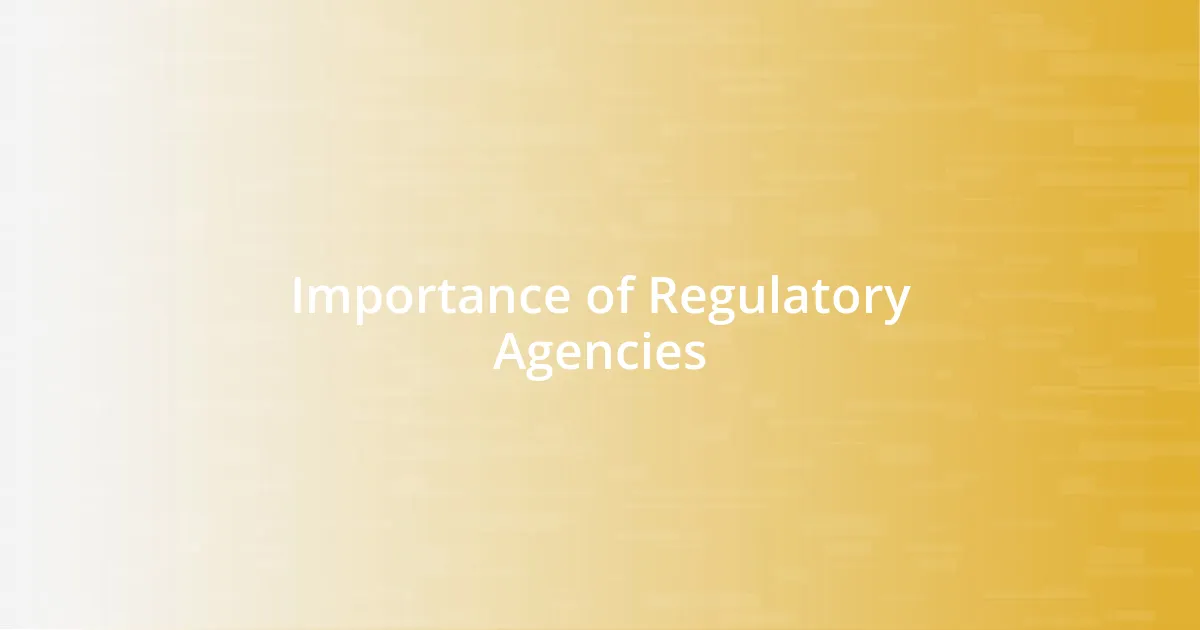
Importance of Regulatory Agencies
Regulatory agencies ensure consumer safety in the CBD market, which I view as paramount. I vividly remember purchasing a CBD oil from an online store, only to discover later that it lacked proper labeling and testing. That experience highlighted for me how vital it is for regulatory bodies to enforce standards so consumers can trust they’re buying safe products.
Without these agencies, the risk of harmful or misrepresented products would increase significantly. I think back to a time when a friend of mine bought a hemp-derived product that was falsely advertised as “100% pure.” It turned out to contain heavy metals, and it was a stark reminder of why regulations matter. They help create a level playing field and promote accountability among manufacturers.
Moreover, as the CBD market continues to grow, regulatory agencies must adapt and update their guidelines. I’ve often seen companies struggle to interpret shifting rules, which can hinder innovation. It makes me uneasy to think that potential benefits of CBD could be stifled by bureaucratic delays. Regulatory agencies must act swiftly to foster a safe and thriving environment for both consumers and producers.
| Role of Regulatory Agencies | Implications Without Regulations |
|---|---|
| Ensure product safety and efficacy | Increased risk of harmful products |
| Standardize labeling and marketing | Deceptive practices and misinformation |
| Facilitate market growth and innovation | Delayed advancements and legal uncertainties |

Role of Government in CBD
The government’s involvement in the CBD landscape is like a double-edged sword. On one hand, I appreciate that agencies are working to establish guidelines, but the process can often feel frustratingly slow. I remember stumbling upon a great CBD-infused beverage, only to find out that it wasn’t compliant with state regulations. That kind of inconsistency makes me realize how crucial it is for government to be both proactive and clear in their regulatory frameworks.
Government roles primarily include:
- Establishing safety standards to protect consumers.
- Creating a clear legal framework that manufacturers can follow.
- Monitoring product quality through testing and compliance checks.
These efforts can shape the CBD market significantly. I sometimes reflect on the potential benefits of a well-regulated industry. It’s empowering to think that, with robust regulations, consumers could confidently explore CBD options, knowing they are backed by government oversight. Yet, it’s also concerning to see the delays in rule implementation, leaving many potential products in limbo. I believe fluid, responsive regulation is vital for the industry to thrive and keep pace with consumer needs.
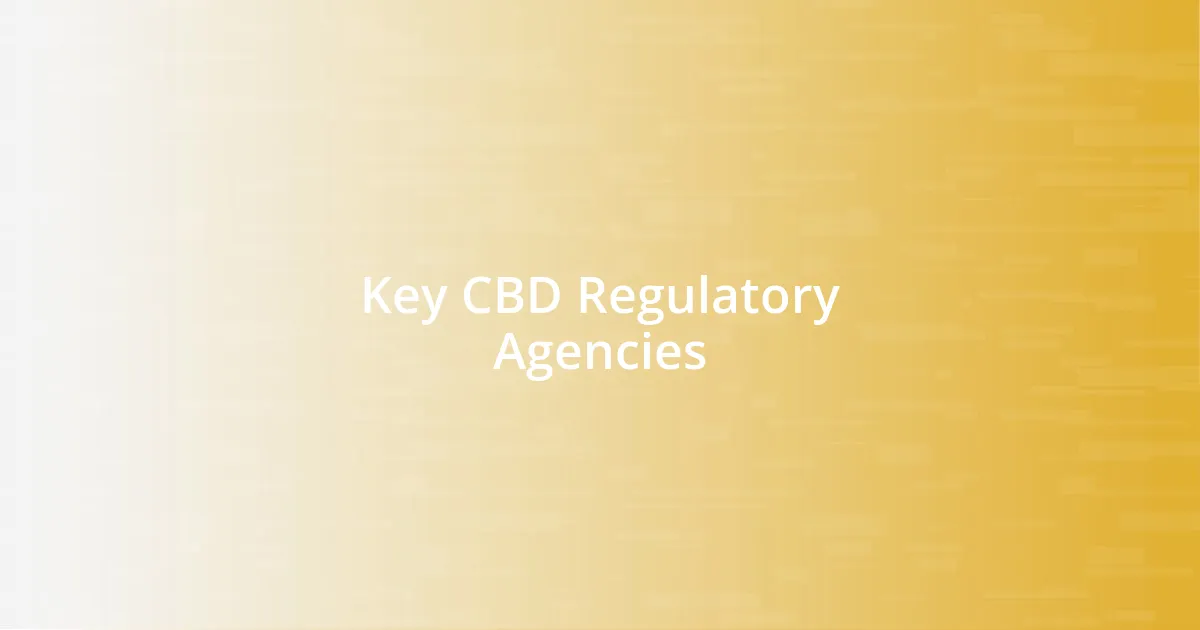
Key CBD Regulatory Agencies
When it comes to key regulatory agencies overseeing the CBD landscape, the Food and Drug Administration (FDA) stands out as a major player in the United States. I remember a conversation with a colleague who was deeply frustrated by the lack of clarity from the FDA regarding CBD products. The uncertainty can sometimes feel like navigating a maze, and it really makes one wonder how consumers can feel confident in their choices when the rules seem to shift unpredictably. The FDA’s decisions can significantly influence product formulation, labeling, and even research opportunities.
In addition to the FDA, state-level agencies also play crucial roles in the regulatory space. Each state has its own set of rules, which can lead to some fascinating discrepancies. I once traveled to a state where CBD was readily available in corner shops, while back home, it was still a gray area. This inconsistency can leave consumers scratching their heads. Why is it that a product deemed safe in one state might not meet the same criteria elsewhere? These variations reinforce the point that consistent oversight is necessary for a cohesive market.
The involvement of organizations like the Hemp Authority is another important layer in this evolving landscape. From my perspective, they work to certify hemp products, ensuring they meet specific quality standards. I’ve encountered brands proudly displaying their Hemp Authority certification, which offered me a sense of security as a consumer. It makes me think—if we can establish a more standardized approach through such certifications, wouldn’t we all get to enjoy the benefits of CBD without the nagging doubts? Effective collaboration between these regulatory bodies and the industry is key to fostering trust and innovation in the market.
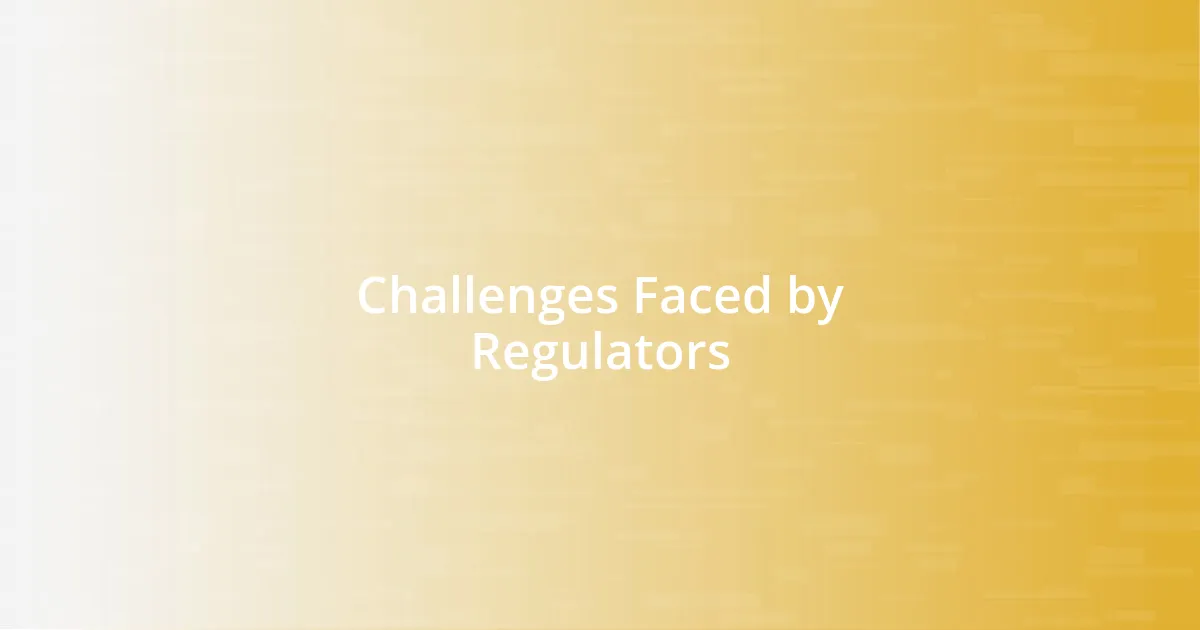
Challenges Faced by Regulators
Navigating the regulatory landscape for CBD can feel like walking a tightrope. One major challenge I often see is the tension between federal and state regulations. For instance, I remember discussing with a local vendor who was passionate about his products but found himself caught between state laws that allowed his sales and federal guidelines that didn’t. It made me wonder: how can businesses thrive when the rules of the game change based on geography? This ambiguity can stifle innovation and lead to confusion among consumers.
Another significant hurdle is the lack of scientific consensus surrounding CBD. Regulatory agencies are sometimes limited by the scarcity of definitive research on the health benefits of CBD. I recall attending a health expo where experts passionately debated the efficacy of CBD for different conditions, and it struck me that without strong evidence, regulators might hesitate to establish clear guidelines. Wouldn’t it be beneficial if there were more collaborative studies to illuminate the facts? The absence of solid data can create a hesitance that impacts both the regulatory process and consumer trust.
Compliance and enforcement present yet another challenge for regulators. I once spoke with a compliance officer who explained how difficult it is to monitor thousands of products flooding the market. With brands popping up overnight, ensuring each product adheres to safety standards can feel overwhelming. I can’t help but feel empathy for those in regulatory roles—how can they effectively regulate when there’s an influx of new players and products? This situation highlights the crucial need for robust systems and resources that can keep pace with this rapidly evolving industry.
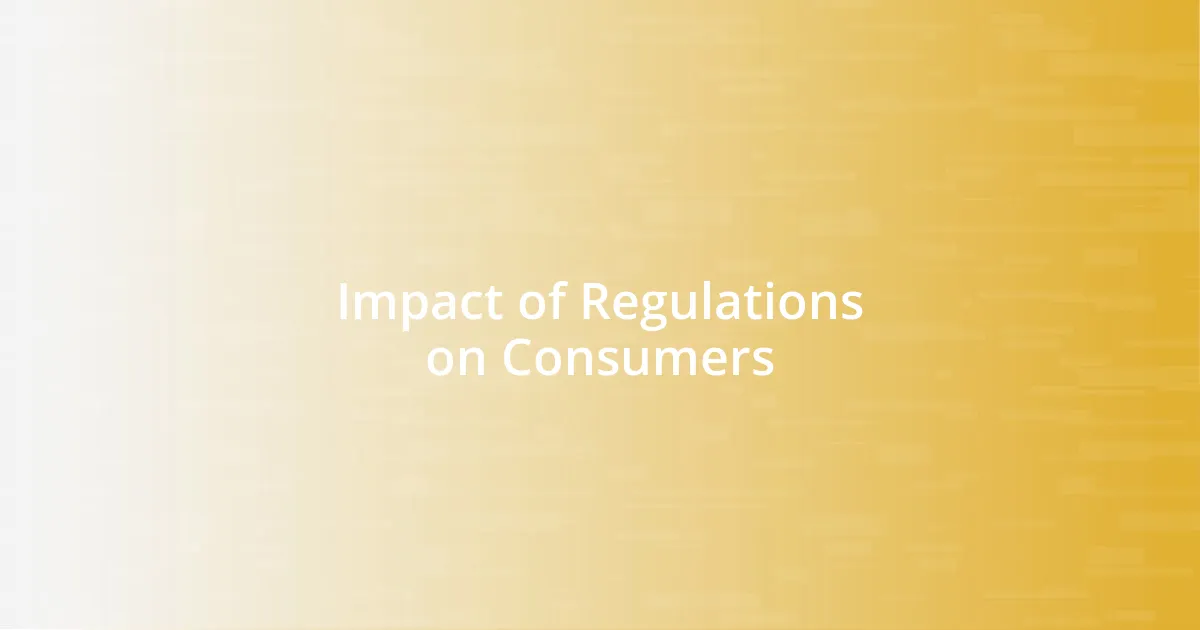
Impact of Regulations on Consumers
Regulations can significantly shape the consumer experience in the CBD market. I recall a time when shopping for CBD oil and being overwhelmed by the myriad of options available. While the variety is exciting, it often comes with confusion, especially when product labels don’t provide clear information about potency or sourcing. Isn’t it frustrating to pay for a product and not fully understand what you’re getting? Consumers deserve transparency to make informed choices, and regulations can help bridge that gap.
Moreover, regulations can also enhance safety. Think about it—if a regulatory body sets high-quality standards, it gives consumers peace of mind. I remember trying a new CBD brand that proudly showcased its compliance with rigorous testing. That assurance made it easier to trust the product and incorporate it into my wellness routine. When consumers know that the products they are purchasing have been vetted, it can reduce anxiety and foster loyalty to brands that prioritize quality.
Additionally, the impact of regulations can lead to increased prices for consumers. I’ve observed that businesses often pass the costs of compliance onto their customers. While I understand the necessity of high standards, it makes me question how this affects accessibility. How can we ensure that everyone who could benefit from CBD is not locked out due to cost? Balancing regulation with affordability is vital to creating a market that serves all consumers effectively.
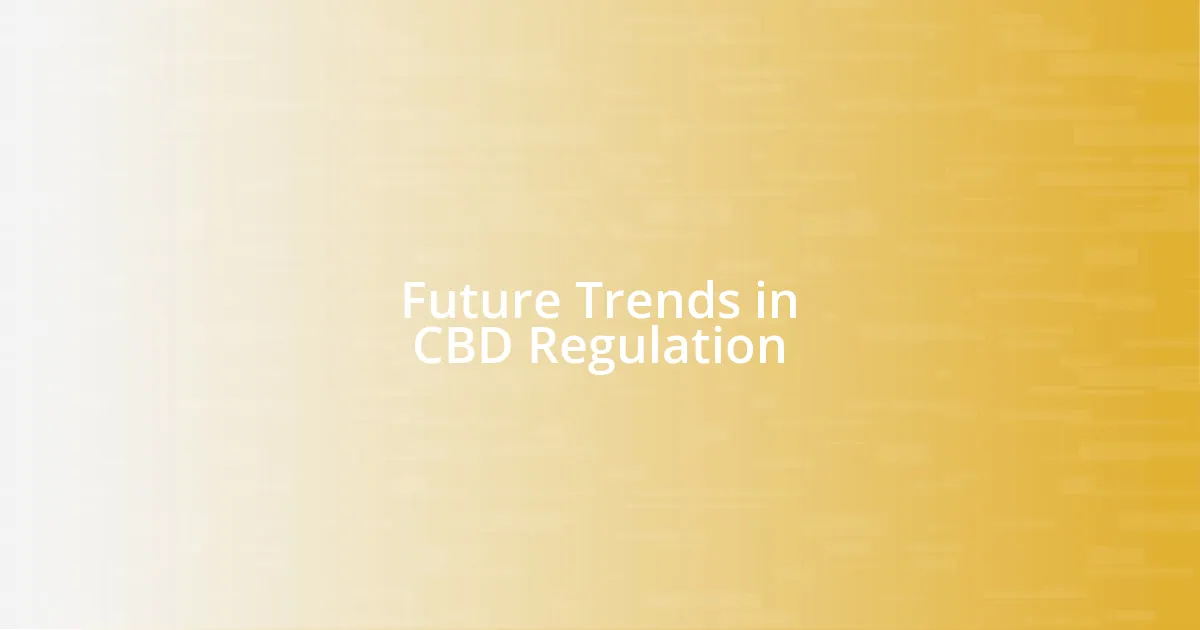
Future Trends in CBD Regulation
Future CBD regulation trends are likely to emphasize more uniformity across states. I’ve often thought about how much easier shopping for CBD would be if we had consistent regulations nationwide. Picture this: a consumer traveling across states could enjoy the same quality and safety standards without grappling with varying laws. Wouldn’t that lead to a smoother experience and potentially bolster consumer trust in the products they choose?
I suspect we’ll also see an increase in collaborative efforts among regulatory agencies and industry stakeholders. Reflecting on my own experiences at industry conferences, I’ve noticed a rising willingness among different entities to join forces. By fostering these partnerships, we can enhance research efforts that solidify the science behind CBD. How exciting would it be to witness regulations driven by robust evidence supporting the benefits of CBD?
Lastly, I believe that consumer education will take center stage in the evolving regulatory landscape. I vividly recall attending a workshop where consumers were educated about reading labels and understanding extraction methods. It struck me that informed consumers are empowered consumers. As regulations adapt, I foresee agencies taking an active role in transparency initiatives. Isn’t it empowering to think of a future where consumers can confidently make choices based on solid knowledge?










